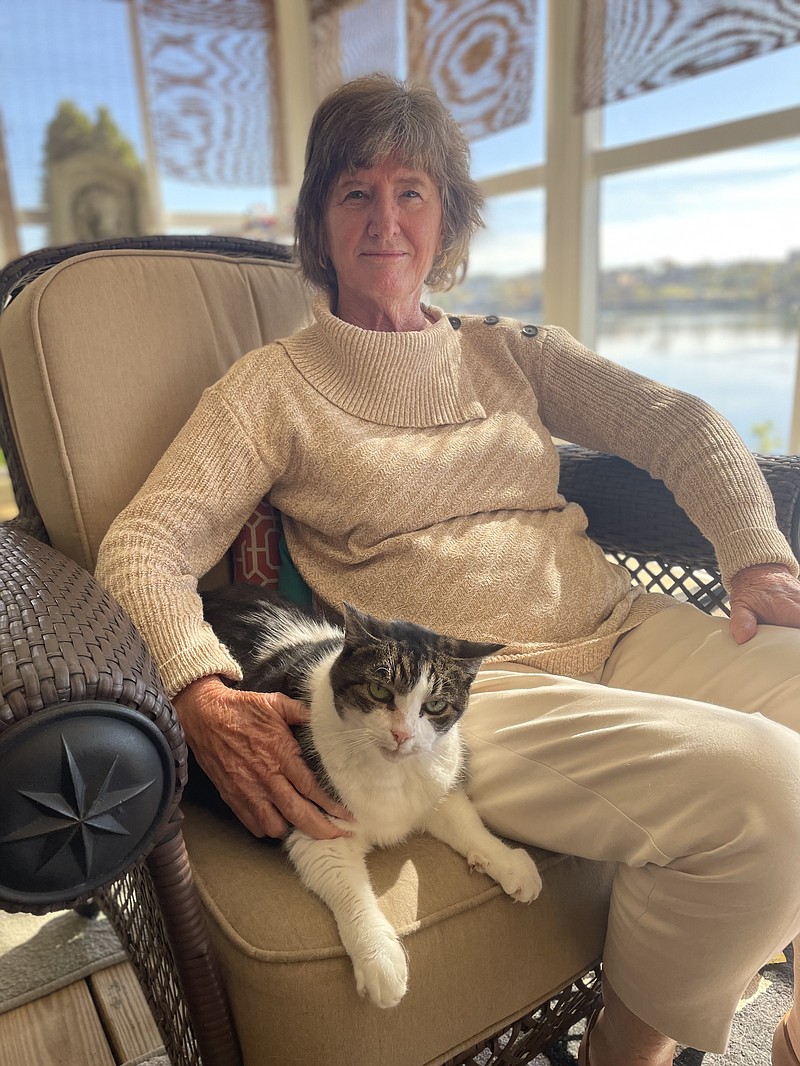Some days, 67-year-old Cherie Martinez sits in the sunroom at her home in Heritage Landing and watches the Life Force helicopters land at Erlanger hospital.
"Now, that's a dangerous job," she muses, stroking the fur of a rescue cat curled up in her chair.
The jet trails that crisscross the sky over Chattanooga also remind Martinez of her 31 years flying for United Airlines, including the last 21 of those years as a captain. When she was promoted to captain in 1999 there were fewer than 100 women captains across the vast airline, she said in an interview. Now, about 800 of United's 12,000-plus pilots are female.
Martinez turned 65 (the mandatory retirement age for United Airlines pilots) in March 2020, just as COVID-19 hit the United States. The virus spread so fast she had to cancel her retirement party.
The story of Martinez's professional life should inspire anyone who values women's empowerment.
Told by an airline at age 18 that she "wasn't good looking enough" to be a flight attendant, and later challenged by a man who said "girls can't fly" airplanes, Martinez not only learned to fly, she ascended to the pinnacle of commercial aviation, captaining wide-body Boeing 777 passenger jets from Washington, D.C., to Europe for a time.
If her professional life was inspiring, her personal life has at times been crushing.
"Sometimes, my life has played out like a Greek tragedy," she said.
Martinez's first husband, an Englishman named Tony Herbert, was killed in an airplane crash in the Bahamas in 1991. Her second husband, Hector Martinez, died of cancer in 2003. And her twin brother, David Dyche, along with her sister-in-law and 17-year-old nephew, were among seven people who died when Dyche's 60-foot schooner went down in a storm off the coast of New Zealand in June 2013. (Cherie Martinez moved to Chattanooga when her husband Hector Martinez was stationed here with the Army National Guard.)
Martinez credits her deep religious faith with getting through those adversities but admits that her life has seen plenty of heartache.
As a youngster, her parents were divorced, and she grew up living with her mother in South Florida. After high school, she applied to be a stewardess -- the airlines' term for flight attendant then -- with National Airlines.
"My life would have been totally different if they did hire me," she said. "Basically, they just said I wasn't good looking enough. They said I didn't meet their needs."
A few years later, Martinez said a young man who was taking flying lessons "bet me that girls couldn't fly." Not one to ignore a challenge, Martinez saved money from her $1.60 an hour minimum wage job to take flying lessons.
"I thought, 'Hmm, I've got to prove him wrong.' (But) I've gotta admit, the first time I (took a lesson), it was like, 'Oh, my gosh, I'm scared to death.'
"It was like $17 bucks (per lesson) and $5 for the instructor," she recalls. "I could only afford a lesson once or twice a month."
After gaining her pilot license, Martinez began the long, slow climb through the ranks of commercial aviation. Along the way, she worked as a flight instructor, a commuter airline pilot and a freight pilot.
In 1989, she was hired as a flight engineer by United Airlines at a time when American airline companies were under intense pressure from the courts and the U.S. government to diversify their flight crews. Until then, jobs in the cockpit had been mainly filled by former military pilots, who were mostly men. Gradually, Martinez progressed at United from flight engineer to co-pilot to captain. Based at Washington's Dulles International Airport throughout her United career, she retired as a captain of the Airbus 320 in 2020.
Through it all, Martinez said she often had to deflect prejudices against women. She experienced male pilots who would barely acknowledge females in the cockpit, she said. Even after she made captain and wore a captain's hat and uniform, some passengers assumed she was a flight attendant.
"The would hand me their trash," she said. "One time, somebody asked me what instrument I played in the Salvation Army."
Soon, though, United came to realize that women pilots were an asset, she said.
"After we women got hired on, United realized that women were a lot easier on the airplane," Martinez said. "(And) they didn't get into fist fights in the cockpit (like some men pilots)."
When she retired, Martinez remember setting the parking brake on her Airbus 320 and feeling her heart sink a bit.
At first, she thought she would walk away from aviation entirely but soon decided she couldn't resist the call of the cockpit. She keeps her flying license current by flying Cessna airplanes out of Crystal Aviation at the Chattanooga Airport.
Occasionally, while flying, she has a slip of the tongue.
"Once in a while I'll call myself 'United' instead of 'Cessna' over the plane radio," she said.
"Life Stories" is published on Mondays. Contact Mark Kennedy at mkennedy@timesfreepress.com or 423-757-6645. Follow him on Twitter @TFPcolumnist.
